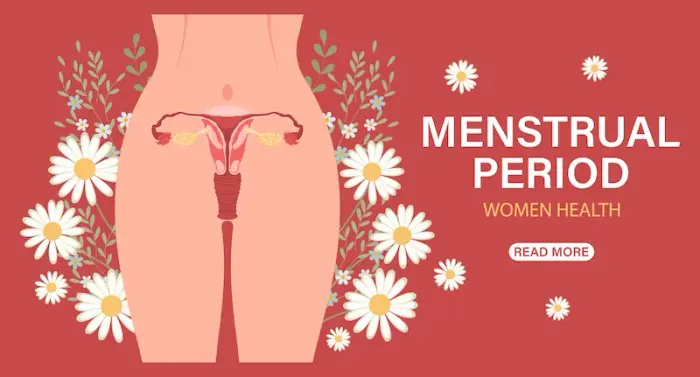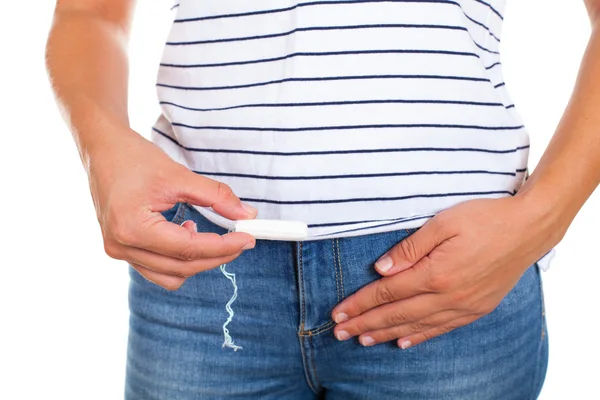Heavy Menstrual Bleeding: Causes, Relief, and When to Seek Help
Struggling with heavy periods? Learn about the causes of heavy menstrual bleeding (menorrhagia), effective relief options, and when it’s time to see a doctor. Get guidance on treatments, lifestyle tips, and red flags you shouldn’t ignore.

Written by Dr. Shaik Abdul Kalam
Reviewed by Dr. D Bhanu Prakash MBBS, AFIH, Advanced certificate in critical care medicine, Fellowship in critical care medicine
Last updated on 13th Jan, 2026

Are your periods disrupting your life? You're not alone. Heavy menstrual bleeding (clinically known as menorrhagia) affects one in five women, yet many suffer in silence, believing it's just their "normal." If you're changing pads or tampons every hour, passing large clots, or constantly worrying about leaks, it's time to understand what's happening and how to take back control. This comprehensive guide will walk you through the potential causes of heavy menstrual bleeding, effective medical and at-home management strategies, and the critical signs that indicate it's time to consult a professional. Let's demystify this common but often overwhelming condition and explore the pathways to finding relief.
What Exactly is Heavy Menstrual Bleeding? (Defining Menorrhagia)
Heavy menstrual bleeding isn't just a "bad period." It's a specific medical condition where blood loss during your cycle is excessive enough to interfere with your physical, social, and emotional well-being. While flow varies from person to person, doctors often define it technically as losing more than 80 millilitres of blood per cycle. Since most of us aren't measuring in millilitres, a more practical definition involves:
• Bleeding that lasts more than 7 days.
• You need to change your pad or tampon every 1-2 hours for several consecutive hours.
• Passing blood clots the size of a quarter or larger.
• Needing to double up on protection (e.g., a tampon and a pad) to prevent leaks.
• Bleeding that disrupts your sleep, forcing you to wake up to change protection.
The impact extends beyond the physical symptoms. It can lead to chronic fatigue, prevent you from engaging in activities you enjoy, cause significant anxiety, and be a major financial burden due to the cost of sanitary products.
Common Causes of Heavy Periods
Understanding the root cause of your heavy bleeding is the first step toward effective treatment. The causes can be broadly categorised.
Hormonal Imbalances
Your menstrual cycle is orchestrated by a delicate balance of estrogen and progesterone. When this balance is disrupted, the endometrial lining (the uterus lining) can become too thick, leading to heavier shedding during your period. Conditions that cause this include:
• Polycystic Ovary Syndrome (PCOS): Causes irregular cycles and can lead to built-up lining.
• Thyroid Problems: Both an underactive (hypothyroidism) and an overactive (hyperthyroidism) thyroid can cause menstrual irregularities.
• Perimenopause: The transition to menopause often involves unpredictable hormonal fluctuations and heavy bleeding.
Structural Uterine Issues
Sometimes, the problem is a physical abnormality within the uterus.
• Uterine Fibroids: These noncancerous growths in the uterine wall are a leading cause of HMB. A 2021 study published in the American Journal of Obstetrics and Gynaecology highlighted that fibroids can significantly increase menstrual blood loss.
• Adenomyosis: A condition where the tissue that normally lines the uterus grows into the muscular uterine wall, causing thickening, pain, and heavy bleeding.
• Uterine Polyps: Small, benign growths on the uterine lining.
Other Medical Conditions and Medications
• Bleeding Disorders: Like von Willebrand disease, which affects blood clotting.
• Pelvic Inflammatory Disease (PID): An infection of the reproductive organs.
• Certain IUDs: While hormonal IUDs often reduce bleeding, the non-hormonal copper IUD can sometimes cause heavier periods.
• Medications: Such as blood thinners or anti-inflammatory drugs.
How is the Cause of Heavy Bleeding Diagnosed?
If you suspect you have heavy menstrual bleeding, a proper diagnosis is crucial. Your doctor will start with a detailed history of your cycles and symptoms. Be prepared to discuss your flow, cycle length, pain levels, and any relevant family history.
They will likely recommend tests to pinpoint the cause:
• Blood Tests: To check for anaemia (low iron), thyroid function, and potential clotting disorders.
• Pap Test: To screen for cervical cancer or inflammation.
• Ultrasound: A transvaginal ultrasound provides a clear image of your uterus, ovaries, and pelvis to look for fibroids, polyps, or adenomyosis.
• Endometrial Biopsy: A sample of your uterine lining is taken to test for abnormalities or cancer, especially if you're over 45.
If your initial tests are inconclusive, your doctor might suggest further procedures like a hysteroscopy, where a tiny camera is inserted into the uterus to see inside directly. If your symptoms are persistent and affecting your daily life, consult a doctor online with Apollo24|7 for an initial evaluation and to discuss which diagnostic steps are right for you.
Medical Treatments for Heavy Menstrual Bleeding
Treatment depends entirely on the underlying cause, your overall health, and whether you wish to have children in the future.
Effective Medications to Reduce Bleeding
• Tranexamic Acid (Lysteda): This is a non-hormonal medication that helps reduce bleeding by promoting blood clotting. It's taken only on heavy flow days.
• Hormonal Intrauterine Devices (IUDs): The levonorgestrel-releasing IUD (e.g., Mirena) is often a first-line treatment. It thins the uterine lining, dramatically reducing blood flow. Studies show it can reduce flow by up to 90%.
• Nonsteroidal Anti-Inflammatory Drugs (NSAIDs): Ibuprofen (Advil, Motrin) or naproxen (Aleve) can help reduce menstrual blood loss and relieve cramping.
Surgical and Procedural Options
When medications aren't enough or aren't suitable, procedures may be considered.
• Endometrial Ablation: A procedure that destroys (ablates) the uterine lining. It significantly reduces bleeding but is not recommended for women who still want to have children.
• Uterine Artery Embolisation: A minimally invasive procedure that cuts off the blood supply to fibroids, causing them to shrink.
• Hysterectomy: The surgical removal of the uterus. This is a permanent solution that ends periods and the ability to bear children. It's typically a last resort after other treatments have failed.
Lifestyle and Home Remedies for Management
While home remedies won't cure an underlying condition, they can help you manage symptoms of heavy periods and improve your quality of life.
• Diet and Nutrition: The biggest risk from HMB is iron-deficiency anaemia. Combat this by incorporating iron-rich foods like spinach, lentils, red meat, and fortified cereals. Pair them with Vitamin C (e.g., oranges, bell peppers) to enhance iron absorption.
• Hydration: Replacing lost fluids is crucial. Drink plenty of water, especially on your heaviest days.
• Heat Therapy: A heating pad or hot water bottle on your abdomen can relax muscles and ease painful cramps associated with heavy flow.
• Rest: Listen to your body. Fatigue is common, so allow yourself time to rest and recover.
Apollo24|7 offers a convenient home collection for tests like a Complete Blood Count (CBC) or ferritin test to easily monitor your iron levels and check for anaemia from the comfort of your home.
When to See a Doctor: Red Flags Not to Ignore
Don't dismiss heavy bleeding as normal. Seek medical advice if you experience:
• Bleeding that soaks through one or more pads or tampons every hour for more than two hours.
• Bleeding between periods or after menopause.
• Signs of anaemia: extreme fatigue, weakness, pale skin, shortness of breath, or dizziness.
• Period pain that is severe and not relieved by over-the-counter medication.
Conclusion
Living with heavy menstrual bleeding can be an isolating and exhausting experience, but it's important to remember that it is a treatable condition. From understanding the potential causes like fibroids and hormonal issues to exploring a range of solutions from lifestyle adjustments to advanced medical treatments, you have multiple paths to finding relief. The most critical step is to break the silence and speak with a healthcare provider. Your period should not control your life. By seeking a proper diagnosis and personalised treatment plan, you can manage your symptoms effectively and regain your energy, confidence, and freedom. If your condition does not improve after trying management methods, book a physical visit to a doctor with Apollo24|7 to discuss a long-term solution tailored for you.
Consult a Gynaecologist for the best advice
Consult a Gynaecologist for the best advice

Dr. Millie Dasgupta
Obstetrician and Gynaecologist
10 Years • MBBS,DNB (Obst. & Gynae.)
Kolkata
MCR SUPER SPECIALITY POLY CLINIC & PATHOLOGY, Kolkata

Dr. Sreeparna Roy
Obstetrician and Gynaecologist
8 Years • MBBS , MS (OBSTETRICS & GYNAECOLOGY), Fellowship in Infertility, Endoscopy & Ultrasonography), Fellowship in Laparoscopy & Hysteroscopy,DRM
Barasat
Diab-Eat-Ease, Barasat

Dr. Rituparna De
Obstetrician and Gynaecologist
7 Years • MBBS, MS (Obstetrics & Gynaecology)
Kolkata
MCR SUPER SPECIALITY POLY CLINIC & PATHOLOGY, Kolkata

Dr. Somdutta Basu
Obstetrician and Gynaecologist
7 Years • MBBS, MS Obstetrics & Gynaecology
Bansdroni
Siddhita Healthcare., Bansdroni

Dr. Sangeetha M
Obstetrician and Gynaecologist
21 Years • MBBS, MS ( Obstetrics & Gynaecology )
Bansdroni
Siddhita Healthcare., Bansdroni
More articles from Menstrual Disorder
Frequently Asked Questions
1. What is considered a 'heavy' period?
period is generally considered heavy if you need to change your pad or tampon every 1-2 hours, bleed for more than 7 days, pass large blood clots, or experience anaemia symptoms like fatigue.
2. Can stress cause heavy menstrual bleeding?
While stress can disrupt your hormones and cause missed or irregular periods, it is less commonly a direct cause of chronic heavy bleeding. However, it can exacerbate existing issues.
3. What is the best over-the-counter medicine for heavy periods?
Nonsteroidal anti-inflammatory drugs (NSAIDs) like ibuprofen (Advil) or naproxen (Aleve) are often recommended. They can reduce prostaglandins, which contribute to heavy flow and cramping.
4. Can heavy bleeding be a sign of cancer?
In rare cases, particularly in perimenopausal and postmenopausal women, heavy bleeding can be a symptom of endometrial (uterine) cancer. This is why a prompt medical evaluation is essential to rule out serious causes.
5. How can I naturally stop heavy periods?
While you can't 'stop' a period naturally, you can manage symptoms. Focus on an iron-rich diet to prevent anaemia, stay hydrated, use heat for cramps, and ensure you get enough rest. However, these are supportive measures and not a substitute for medical treatment for underlying causes.


